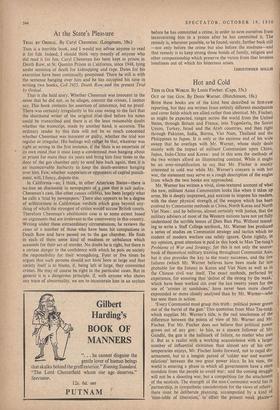At the State's Pleasure
TRIAL BY ORDEAL. By Caryl Chessman. (Longmans, 18s.)
Tins is a horrible book, and 1 would not advise anyone to read it for fun. Indeed, I should think very meanly of anyone who did read it for fun. Caryl Chessman has been kept in prison in Death Row, at St. Quentin Prison in California, since 1948, lying under sentence of death for kidnapping and rape. Dates for his execution have been continually postponed. There he still is with the sentence hanging over him and he has occupied his time in writing two books, Cell 2455, Death Row and the present Trial by Ordeal.
That is the bald story. Whether Chessman was innocent in the sense that he did not, as he alleges, commit the crimes, I cannot say. This book contains his assertion of innocence, but no proof. There was certainly irregularity in his case owing to the fact that the shorthand writer of the original trial died before his notes could be transcribed and there is at the least reasonable doubt whether the transcript, made by another hand, is accurate. The ordinary reader by this date will not be so much concerned whether Chessman was innocent or guilty, whether the trial was regular or irregular. His feelings will rather be that, whatever was right or, wrong in the first instance, if the State is so uncertain of its own mind that it must keep a condemned man hanging about in prison for more than six years and bring him four times to the door of the gas chamber only to send him back again, then it is an inconceivable barbarity to keep the death-sentence hanging over him. Few, whether supporters or opponents of capital punish- ment, will, l fancy, dispute this.
In California—as, I think, in other American States—there is no ban on discussion in newspapers of a case that is sub judice. Chessman's case, like other causes celebres, has been largely what he calls a 'trial by newspapers.' There also appears to be a degree of arbitrariness in Californian verdicts which goes beyond any- thing of which the strongest of critics would accuse-'British courts. Therefore Chessman's abolitionist case is to some extent based on arguments that are irrelevant to the controversy in this country. Writing under these extraordinary circumstances, he reviews the cases of a number of those who have been his companions in Death Row and have passed on to the gas chamber. He finds in each of them some kind of madness or unbalance which accounts for their act of murder. No doubt he is right, but there is a certain danger in the confidence with which he puts on society the responsibility for their wrongdoing. Four or five times he argues that such persons should not have been at large and that society itself is to blame, if, being left at large, they committed crimes. He may of course be right in the particular cases. But in general it is a dangerous principle, if, with anyone who shows any trace of abnormality, we are to incarcerate him in an asylum
before he has committed a crime, in order to save ourselves from incarcerating him in a prison after he has committed it. The remedy is, wherever possible, to be found, surely, farther back still —not only before the crime but also before the madness—and that remedy is to keep strong those bonds of family, religion and other companionship which preserve the victim from that loveless loneliness out of which his bitterness arises.
CHRISTOPHER HOLLIS


































 Previous page
Previous page